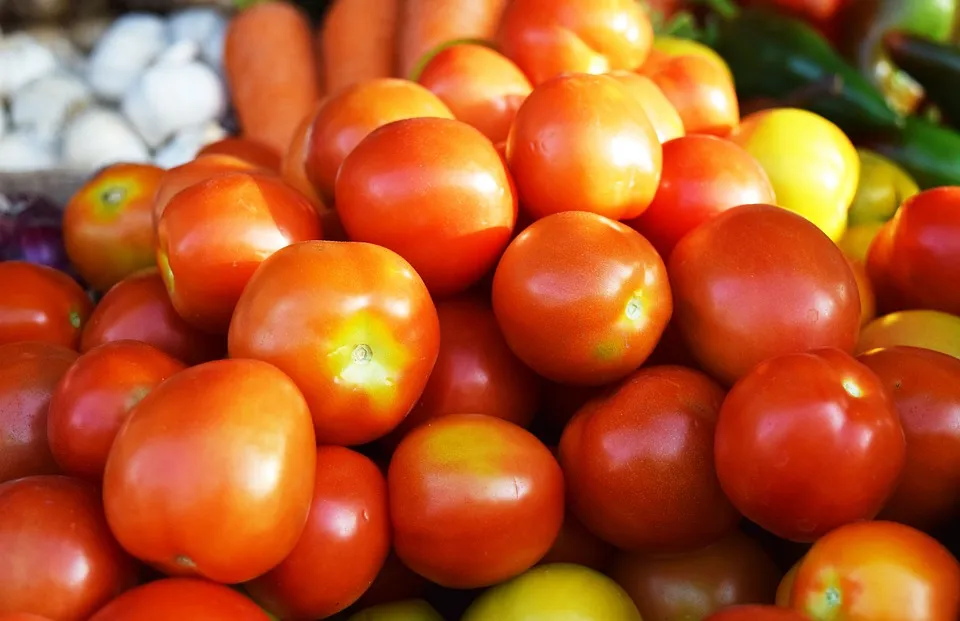
Are you a barbecue sauce enthusiast? Have you ever wondered about the secret ingredients that make up this tangy and flavorful condiment? Well, one question that often arises is whether or not tomatoes are a key component of barbecue sauce. In this article, we’ll delve into the world of barbecue sauce and explore the truth behind the presence of tomatoes in this beloved sauce. So, grab your favorite barbecue utensils and get ready to uncover the delicious mysteries of barbecue sauce!
When it comes to barbecue sauce, there are countless variations and regional styles to choose from. From the sweet and smoky flavors of Kansas City-style sauce to the vinegar-based tang of Carolina-style sauce, each region has its own unique take on this culinary delight. But what about tomatoes? Are they a staple ingredient in all barbecue sauces? This is a question that has sparked many debates among barbecue enthusiasts. In the following paragraphs, we’ll dive into the world of barbecue sauce and explore whether or not tomatoes play a role in its creation.
Tomato-based Barbecue Sauces: Exploring the Key Ingredient
So, you’ve decided to take your grilling skills to the next level and venture into the world of barbecue sauces. One of the most popular and widely used types of barbecue sauce is the tomato-based variety. Let’s dive into this key ingredient and explore why it plays such a crucial role in creating delicious barbecue flavors.
Tomatoes are a staple in many barbecue sauces because they bring a unique combination of tanginess and sweetness to the flavor profile. The natural acidity of tomatoes helps to balance out the richness of grilled meats, while their natural sugars contribute to a delightful touch of sweetness.
In the United States, tomato-based barbecue sauces are particularly prevalent in the southern and midwestern regions. These sauces often feature a combination of tomato paste, ketchup, or tomato sauce as the base ingredient. The tomatoes are then enhanced with a blend of spices, vinegar, sugar, and other flavorings to create a well-rounded and delicious sauce.
However, it’s important to note that not all barbecue sauces contain tomatoes. In fact, different regions have their own unique styles and flavor profiles when it comes to barbecue sauce. For example:
- Mustard-based sauces are popular in South Carolina, where they add a tangy and slightly spicy kick to grilled meats.
- Vinegar-based sauces are commonly found in North Carolina and are known for their tangy and sharp flavors.
- Alabama white sauce is a creamy and tangy sauce made with mayonnaise, vinegar, and spices, but no tomatoes.
So why choose a tomato-based barbecue sauce? Well, aside from the delicious flavor, tomatoes also contribute to the thick and rich texture that many people love in their barbecue sauces. The natural pectin found in tomatoes helps to create a sauce with body and cling, making it the perfect companion for grilled meats.
Whether you’re slathering it on ribs, brushing it onto chicken, or using it as a dipping sauce for your favorite grilled vegetables, tomato-based barbecue sauces are a versatile and flavorful addition to any backyard barbecue. So grab your apron, fire up the grill, and get ready to elevate your grilling game with the tangy-sweet goodness of a tomato-based barbecue sauce.
The History of Barbecue Sauce: From Tangy to Sweet and Spicy
Now that you’ve learned about the different regional styles of barbecue sauce, let’s dive into the fascinating history behind this delicious condiment. Barbecue sauce has come a long way from its humble beginnings, evolving into a staple in backyard cookouts and a beloved accompaniment to grilled meats.
The origins of barbecue sauce can be traced back to early Native American cooking practices, where they used a blend of spices and vinegar to enhance the flavor of roasted meats. As Europeans settled in America, they brought their own culinary traditions, incorporating ingredients like tomatoes and molasses into barbecue sauce recipes. This infusion of flavors gave birth to the tangy and sweet profiles we know and love today.
In the southern United States, barbecue sauce took on a variety of regional characteristics. In the Carolinas, a vinegar-based sauce with a hint of heat became popular, while in Kansas City, a thick and sweet tomato-based sauce dominated the scene. The unique blend of flavors in each region’s barbecue sauce reflected the local ingredients and cultural influences.
Over time, barbecue sauce evolved even further, with regional variations adding their own twists. Some sauces leaned towards the tangy side, combining vinegar, mustard, and spices, while others embraced a sweeter profile with the addition of brown sugar, honey, or molasses. Spicy barbecue sauces also emerged, incorporating elements like chipotle peppers or cayenne pepper for an extra kick.
As grilling and barbecue culture spread across the country, the popularity of barbecue sauce soared. Today, you can find a wide array of barbecue sauce options in supermarkets, from traditional recipes to innovative blends that push the boundaries of flavor. Whether you prefer the tangy punch of a vinegar-based sauce or the sweet and smoky notes of a tomato-based one, there’s a barbecue sauce out there to suit every palate.
So, the next time you fire up the grill, don’t forget to slather on some delicious barbecue sauce. It’s not just a condiment; it’s a flavorful journey through history, adding a burst of tanginess, sweetness, and spice to your grilled creations.
What Gives Barbecue Sauce Its Signature Taste?
Now that you have a better understanding of the history and regional variations of barbecue sauce, let’s dive into what gives this delicious condiment its signature taste.
Tomatoes play a key role in many barbecue sauce recipes, adding a tangy and slightly sweet flavor that complements the smoky taste of grilled meats. Whether it’s in the form of tomato paste, ketchup, or even fresh tomatoes, this versatile ingredient brings a rich depth of flavor to your barbecue sauce.
But tomatoes aren’t the only star of the show. Sweeteners like brown sugar, molasses, or honey are often added to balance out the acidity of the tomatoes and enhance the overall taste. These sweeteners bring a touch of sweetness that can range from subtle to bold, depending on the recipe.
To add some complexity and depth to the sauce, vinegar is commonly used. Different types of vinegar, such as apple cider vinegar or white vinegar, can be used to achieve various flavor profiles. The tanginess of the vinegar balances out the sweetness and adds a refreshing kick to the sauce.

« Are Grilling Mats Worth It?
Ultimate Guide to Hosting a Successful Barbecue: Tips, Tools, and Mouthwatering Menus »
Spices and seasonings are what truly give barbecue sauce its distinct flavor. Each recipe may vary, but common spices include garlic powder, onion powder, paprika, chili powder, and black pepper. These spices add a layer of complexity and heat to the sauce, creating a well-rounded taste that complements your grilled meats perfectly.
Lastly, some barbecue sauce recipes may incorporate smoke flavor to enhance the overall smokiness of the grilled meats. This can be achieved by adding liquid smoke or using smoked spices like smoked paprika or chipotle powder. The smoky flavor adds a delicious depth to the sauce and makes it a perfect accompaniment to any grilled dish.
As you can see, barbecue sauce is a unique blend of flavors, with tomatoes, sweeteners, vinegar, spices, and smoke all working together to create that irresistible taste. Experiment with different ingredients and ratios to find your own signature barbecue sauce that will make your grilled dishes truly unforgettable.
The Tomato Debate: Are There Really Tomatoes in Barbecue Sauce?
When it comes to barbecue sauce, there are endless debates about the perfect ingredients and flavors. One of the most common questions that arises is whether or not there are tomatoes in barbecue sauce. Well, my fellow grill masters, the answer is both yes and no.
Traditionally, barbecue sauces were tomato-based, with the tangy sweetness of tomatoes providing the perfect base for balancing out the smoky flavors of grilled meats. However, regional variations have led to a wide range of barbecue sauce recipes, some of which do not include tomatoes at all.
In the southern United States, for example, vinegar-based barbecue sauces are popular, where the sharpness of vinegar takes center stage. These sauces are light and tangy, with a touch of sweetness from ingredients like brown sugar or molasses. They are perfect for basting and mopping on slow-cooked pork shoulder or ribs.
In contrast, Kansas City-style barbecue sauce is known for its thick, rich, and tomato-based consistency. The combination of tomatoes, molasses, and spices creates a sweet and savory sauce that pairs wonderfully with beef brisket and grilled chicken.
So, whether or not there are tomatoes in barbecue sauce depends on the region and the specific recipe being used. The beauty of barbecue sauce is that it can be customized to your liking. If you prefer a tomato-based sauce, you can experiment with different types of tomatoes, such as canned, fresh, or even sun-dried tomatoes, to achieve the desired flavor and texture.
On the other hand, if you prefer a sauce without tomatoes, you can explore the world of vinegar-based or mustard-based sauces, which offer a unique tangy twist. The key is to find the balance of flavors that suits your taste buds and complements the grilled meats you love to cook.
Tomato-Free Barbecue Sauce Alternatives: Exploring Different Variations
Now that we’ve discussed the role of tomatoes in barbecue sauce, let’s explore some delicious tomato-free alternatives that you can experiment with. While tomatoes are a popular ingredient in many barbecue sauce recipes, there are plenty of other flavors that can be used to create a tangy and savory sauce that will elevate your grilled dishes.

- Mustard-Based Sauces: One popular tomato-free option is a mustard-based barbecue sauce. This type of sauce is commonly found in South Carolina and adds a tangy and slightly spicy flavor to your grilled meats. It’s made with a combination of mustard, vinegar, brown sugar, and spices like paprika and cayenne pepper. The result is a vibrant and zesty sauce that pairs perfectly with pork and chicken.
- Vinegar-Based Sauces: Another tomato-free alternative is a vinegar-based barbecue sauce. This style of sauce is popular in regions like North Carolina and is known for its tangy and acidic flavor profile. It typically includes ingredients like vinegar, spices, and sometimes a touch of sweetness from ingredients like honey or molasses. The acidity of the vinegar helps to tenderize the meat and adds a bright and refreshing taste.
- Fruit-Based Sauces: If you’re looking for a unique twist on barbecue sauce, consider experimenting with fruit-based alternatives. Pineapple, peach, and mango can all be used to create a sweet and tangy sauce that pairs well with grilled chicken and pork. Simply blend the fruit with vinegar, spices, and a touch of sweetness to create a flavorful and tropical sauce that will impress your guests.
Remember, the beauty of barbecue sauce is its versatility. Feel free to get creative and customize your sauce with your favorite flavors. Whether you prefer a tomato-free option or want to include tomatoes in your recipe, the key is to balance the flavors and create a sauce that complements your grilled dishes.
Conclusion: Embracing the Diverse World of Barbecue Sauces
As you’ve discovered in this article, the world of barbecue sauces is a diverse and flavorful one. From the tangy vinegar-based sauces of the Carolinas to the sweet and smoky tomato-based sauces of Kansas City, there is no one-size-fits-all answer to whether or not there are tomatoes in barbecue sauce. It all depends on the region and recipe you’re using.
The beauty of barbecue sauce lies in its versatility and ability to be customized to suit your personal taste. Whether you prefer the rich and tangy flavors of a mustard-based sauce, the bold and spicy kick of a vinegar-based sauce, or the unique sweetness of a fruit-based sauce, there are plenty of tomato-free alternatives to explore.
So don’t be afraid to experiment and get creative with your barbecue sauce. Embrace the diversity of flavors and ingredients, and make it your own. Whether you choose to include tomatoes or not, the key is to enjoy the delicious and mouthwatering experience of barbecue. Happy grilling!













